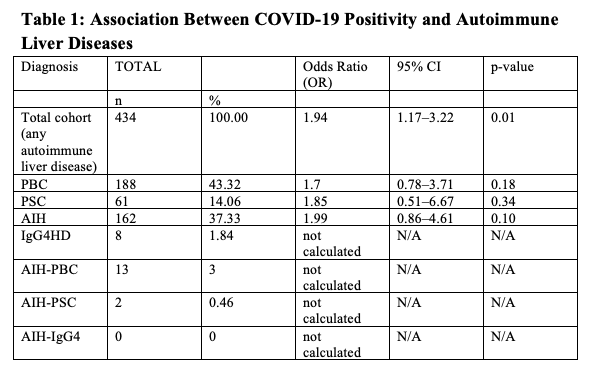Sunday Poster Session
Category: Liver
P1527 - Association Between Prior COVID-19 Infection and New Diagnoses of Autoimmune Liver Diseases: A Retrospective Case-Control Study
Sunday, October 26, 2025
3:30 PM - 7:00 PM PDT
Location: Exhibit Hall

Gregory Capelli, DO
Aurora Healthcare
Milwaukee, WI
Presenting Author(s)
Gregory Capelli, DO1, Dawn Wankowski, 1, James Adefisoye, 1, Sarah Riutta, 1, Meklit Hunde, MD1, Eitan Scheinthal, DO1, Mitchell Capelli, MD2, Rehana Begum, MD1
1Aurora Healthcare, Milwaukee, WI; 2Orlando Health, St. Petersburg, FL
Introduction: Previous studies have identified SARS-CoV-2 as a possible trigger for autoimmunity through immune system hyperstimulation and molecular mimicry. Therefore, one potential complication of COVID-19 is the development of autoimmune diseases, including primary sclerosing cholangitis (PSC), primary biliary cholangitis (PBC), autoimmune hepatitis (AIH), and IgG4-related hepatobiliary disease (IgG4-HD). Establishing COVID-19 as a risk factor for these conditions could have significant clinical implications, especially if the incidence of these diseases rises in the post-pandemic era. This study aims to determine whether prior COVID-19 positivity is associated with new diagnoses of autoimmune liver diseases.
Methods: A retrospective case-control study was conducted using the electronic medical records of a large community-based healthcare system in Illinois and Wisconsin. Patients with ICD-10 codes for PSC, PBC, AIH, and IgG4-HD who sought care between January 2020 and January 2023 were identified. Manual chart review confirmed diagnoses based on clinical, serologic, and/or histologic findings and verified COVID-19 testing status by PCR in a healthcare setting. Cases were matched 1:1 to controls by age, sex, and race, and odds ratios (ORs) with 95% confidence intervals (CIs) were calculated.
Results: Of 2,739 patients identified, 434 met inclusion criteria after manual review (188 PBC, 61 PSC, 162 AIH, 8 IgG4-HD, 13 PBC-AIH overlap, 2 PSC-AIH overlap). Among patients who had COVID-19 prior to diagnosis, the median time from infection to liver disease diagnosis was 11.2 months (range 0.37–26.6 months). The OR for any autoimmune liver disease following a positive COVID-19 test was 1.94 (95% CI 1.17–3.22, p=0.01). ORs for PSC, AIH, and PBC were 1.85 (95% CI 0.51–6.67, p=0.34), 1.99 (95% CI 0.86–4.61, p=0.10), and 1.70 (95% CI 0.78–3.71, p=0.18), respectively. Due to small sample sizes, ORs for overlap syndromes and IgG4-HD were not calculated.
Discussion: Although individual autoimmune liver diseases did not reach statistical significance, the statistically significant association observed when these diseases were considered as a group suggests a possible shared immune-mediated mechanism following COVID-19 infection. These findings do not establish a causal relationship between COVID-19 and PSC, PBC, or AIH individually. However, the observed association, combined with biologically plausible mechanisms, supports the need for larger, multicenter studies to further investigate this potential link.

Figure: Table 1: Demographic characteristics and odds ratios (ORs) for the association between prior COVID-19 positivity and the diagnosis of autoimmune liver diseases, including PBC, PSC, AIH, and IgG4-HD. Odds ratios with 95% confidence intervals (CIs) and p-values are provided for each condition. The total cohort includes all autoimmune liver disease cases combined. ORs for overlap syndromes and IgG4-HD were not calculated due to small sample sizes.
Disclosures:
Gregory Capelli indicated no relevant financial relationships.
Dawn Wankowski indicated no relevant financial relationships.
James Adefisoye indicated no relevant financial relationships.
Sarah Riutta indicated no relevant financial relationships.
Meklit Hunde indicated no relevant financial relationships.
Eitan Scheinthal indicated no relevant financial relationships.
Mitchell Capelli indicated no relevant financial relationships.
Rehana Begum indicated no relevant financial relationships.
Gregory Capelli, DO1, Dawn Wankowski, 1, James Adefisoye, 1, Sarah Riutta, 1, Meklit Hunde, MD1, Eitan Scheinthal, DO1, Mitchell Capelli, MD2, Rehana Begum, MD1. P1527 - Association Between Prior COVID-19 Infection and New Diagnoses of Autoimmune Liver Diseases: A Retrospective Case-Control Study, ACG 2025 Annual Scientific Meeting Abstracts. Phoenix, AZ: American College of Gastroenterology.
1Aurora Healthcare, Milwaukee, WI; 2Orlando Health, St. Petersburg, FL
Introduction: Previous studies have identified SARS-CoV-2 as a possible trigger for autoimmunity through immune system hyperstimulation and molecular mimicry. Therefore, one potential complication of COVID-19 is the development of autoimmune diseases, including primary sclerosing cholangitis (PSC), primary biliary cholangitis (PBC), autoimmune hepatitis (AIH), and IgG4-related hepatobiliary disease (IgG4-HD). Establishing COVID-19 as a risk factor for these conditions could have significant clinical implications, especially if the incidence of these diseases rises in the post-pandemic era. This study aims to determine whether prior COVID-19 positivity is associated with new diagnoses of autoimmune liver diseases.
Methods: A retrospective case-control study was conducted using the electronic medical records of a large community-based healthcare system in Illinois and Wisconsin. Patients with ICD-10 codes for PSC, PBC, AIH, and IgG4-HD who sought care between January 2020 and January 2023 were identified. Manual chart review confirmed diagnoses based on clinical, serologic, and/or histologic findings and verified COVID-19 testing status by PCR in a healthcare setting. Cases were matched 1:1 to controls by age, sex, and race, and odds ratios (ORs) with 95% confidence intervals (CIs) were calculated.
Results: Of 2,739 patients identified, 434 met inclusion criteria after manual review (188 PBC, 61 PSC, 162 AIH, 8 IgG4-HD, 13 PBC-AIH overlap, 2 PSC-AIH overlap). Among patients who had COVID-19 prior to diagnosis, the median time from infection to liver disease diagnosis was 11.2 months (range 0.37–26.6 months). The OR for any autoimmune liver disease following a positive COVID-19 test was 1.94 (95% CI 1.17–3.22, p=0.01). ORs for PSC, AIH, and PBC were 1.85 (95% CI 0.51–6.67, p=0.34), 1.99 (95% CI 0.86–4.61, p=0.10), and 1.70 (95% CI 0.78–3.71, p=0.18), respectively. Due to small sample sizes, ORs for overlap syndromes and IgG4-HD were not calculated.
Discussion: Although individual autoimmune liver diseases did not reach statistical significance, the statistically significant association observed when these diseases were considered as a group suggests a possible shared immune-mediated mechanism following COVID-19 infection. These findings do not establish a causal relationship between COVID-19 and PSC, PBC, or AIH individually. However, the observed association, combined with biologically plausible mechanisms, supports the need for larger, multicenter studies to further investigate this potential link.

Figure: Table 1: Demographic characteristics and odds ratios (ORs) for the association between prior COVID-19 positivity and the diagnosis of autoimmune liver diseases, including PBC, PSC, AIH, and IgG4-HD. Odds ratios with 95% confidence intervals (CIs) and p-values are provided for each condition. The total cohort includes all autoimmune liver disease cases combined. ORs for overlap syndromes and IgG4-HD were not calculated due to small sample sizes.
Disclosures:
Gregory Capelli indicated no relevant financial relationships.
Dawn Wankowski indicated no relevant financial relationships.
James Adefisoye indicated no relevant financial relationships.
Sarah Riutta indicated no relevant financial relationships.
Meklit Hunde indicated no relevant financial relationships.
Eitan Scheinthal indicated no relevant financial relationships.
Mitchell Capelli indicated no relevant financial relationships.
Rehana Begum indicated no relevant financial relationships.
Gregory Capelli, DO1, Dawn Wankowski, 1, James Adefisoye, 1, Sarah Riutta, 1, Meklit Hunde, MD1, Eitan Scheinthal, DO1, Mitchell Capelli, MD2, Rehana Begum, MD1. P1527 - Association Between Prior COVID-19 Infection and New Diagnoses of Autoimmune Liver Diseases: A Retrospective Case-Control Study, ACG 2025 Annual Scientific Meeting Abstracts. Phoenix, AZ: American College of Gastroenterology.
